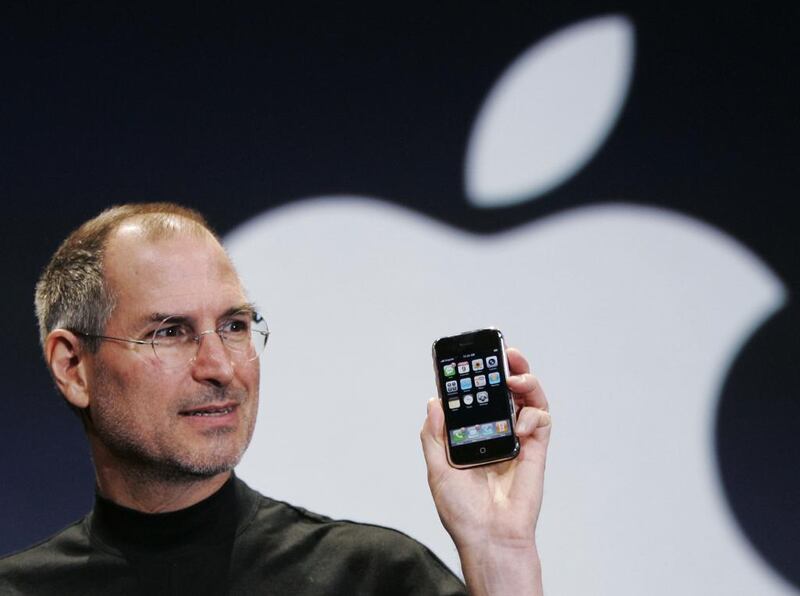“Not a very good email machine,” was the initial verdict of Microsoft chief executive Steve Ballmer.
Jim Balsillie of smartphone titan BlackBerry dismissed it as “one more entrant into an already very busy space”.
Ten years after the iPhone first hit the shops, it’s easy to look back at such predictions and laugh.
But it’s debatable whether even Apple’s late chief executive Steve Jobs could have foreseen the pioneering smartphone’s astonishing impact on the world, and on Apple.
Entering a crowded market with its first mobile phone, Apple went on to sweep all before it, quickly eclipsing established smartphone brands such as Nokia, Microsoft and BlackBerry.
“There is absolutely no denying that the iPhone changed the smartphone industry,” says Abbas Jaffar Ali, founder of the UAE tech news website TBreak. “It was the perfect mix of vision, strategy and technology – with a bit of luck thrown in.”
At a time when mobile phones were getting smaller and smaller, Apple took the opposite approach with what was at the time an enormous 3.5 inch screen, one that eschewed the customary stylus for a game-changing touchscreen.
“Steve Jobs realised that a full-screen touchscreen phone would be revolutionary,” Mr Ali says. “We had seen full-screen phones before but none with the intuitiveness of the iPhone.”
And while the technology inside the early iPhones was basic compared with other smartphones, Apple’s handsets stood out thanks to the look from the company’s chief design officer, Jonathan Ive.
“It looked like no other phone on the market,” says Ashish Panjabi, chief operating officer of Jacky’s Retail. “Phones back then were essentially black rectangles made out of materials that felt plasticky.
“There was a clear difference in build and feel quality, just like there was on Nokia phones at the dawn of the mobile phone era.”
The iPhone would go on to sell over a billion units by midway through last year, making it arguably the most successful consumer product of all time and making Apple the world’s largest company in the process.
But aside from the sizeable impact on Apple’s bottom line, the iPhone changed the perception of the smartphone from a businessman’s phone that also sent emails, to a device that took centre stage in the lives of users.
Since its launch in 2007, its growing functionality has disrupted countless sectors including gaming, entertainment, photography and Apple’s traditional mainstay of personal computing.
“Quite simply, the iPhone changed how we live our lives today,” says Mr Panjabi. “It’s not just about how we communicate. Think about how you work, how you drive, how you consumer media.
“Virtually every facet of life is different now because of smartphones and that’s ultimately down to the iPhone.”
As Apple prepares its 10th anniversary iPhone for launch this year, the company no longer has the smartphone market to itself in terms of sales or innovation.
Last year, iPhone reported its first ever fall in sales for two consecutive quarters, with sales again falling during the first three months of this year.
Arch-rival Samsung, which quickly learnt from Apple’s emphasis on design, again overtook Apple to become the world’s biggest smartphone maker in the first three months.
Meanwhile, the breathless innovation curve of the iPhone’s early years has now levelled off, in common with the rest of the smartphone industry.
The key rumoured features of this year’s 10th anniversary iPhone – wireless charging, fewer physical keys, an edge-to-edge screen and augmented reality – are all features that are already available on others.
But while the pace of innovation has changed, customer attachment to the iPhone brand remains as strong as ever 10 years on, meaning it is unlikely to go the way of former favourites such as BlackBerry and Nokia.
“Apple is still king when it comes to the total profit extracted from the industry,” Mr Ali says.
“With the coming iPhone rumoured to have a major redesign as well as Apple’s push into augmented reality, I believe Apple will have a massive 2017.”
jeverington@thenational.ae






